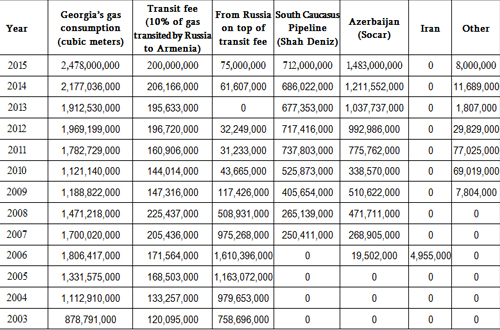| U.S. Ambassador on Georgia’s Talks with Gazprom |
| Civil Georgia, Tbilisi / 18 Jan.'16 / 19:53 |
U.S. ambassador to Georgia, Ian Kelly, said that the Georgian government has been “very open with us” about energy policy and its talks with Russia’s Gazprom.
“I think it’s always important that governments be as transparent as possible about their energy policy, and they have been very open with us. We have expressed our concerns that Georgia not become too dependent on one source of energy – that they keep a good diversification of energy – and we are satisfied with their explanations,” he told journalists in Tbilisi on January 18, when asked about complaints that the government was not providing enough information about talks with Gazprom.
Asked if such talks with Gazprom are reasonable while Russia continues occupation of Georgia’s breakaway regions of Abkhazia and South Ossetia, the U.S. ambassador responded: “I think that Georgia does have a short term energy need, and I think it’s prudent to talk to all potential energy suppliers. And, of course, I take your point, we are very concerned about the occupation of Georgia by Russia. But, I think the Georgian government is very cognizant of this issue and the challenges that this presents.”
According to the Georgian Energy Ministry it holds talks with Gazprom on terms of transit of Russian gas to Armenia via Georgia – Gazprom wants to pay cash as a transit fee instead of giving Georgia 10% of gas transported to Armenia.
Negotiations also involve purchasing of additional gas from Gazprom to fill the gap amid increasing gas consumption, according to the Energy Minister Kakha Kaladze.
On top of transit fee, Georgia was also importing relatively small volumes of gas from Russia over the past five years, exception was 2013, according to Energy Ministry’s data.
Talks with Gazprom over supply of additional gas volumes have become source of opposition’s criticism of the authorities as opponents fear that it may lead to Georgia’s energy dependence on Russia and affect negatively on ties with strategic partner Azerbaijan, which supplied about 88.5% of Georgia’s gas needs in 2015.

Breakdown of Georgian natural gas consumption and imports per year and per source of supply in cubic meters between 2003 and 2015. Data for 2015 are preliminary. Source: Georgian Energy Ministry
Georgia’s total gas consumption in 2015 stood at 2.47 billion cubic meters, 13.8% and 29.5% increase compared to 2014 and 2013, respectively, according to preliminary data provided by the Energy Ministry on January 18.
753 million cubic meters of gas was consumed by households; 650 million cubic meters by – gas-fired power plants, and other commercial entities consumed over 1.07 billion cubic meters of gas in 2015.
Georgia receives gas from two sources in Azerbaijan. About 712 million cubic meters of Azerbaijani gas came in 2015 as part of the deal in frames of the BP-operated South Caucasus Pipeline, which transports gas from Shah Deniz offshore field in the Caspian Sea to Turkey via Georgia. 1.48 billion cubic meters were imported in 2015 as part of a separate contract with SOCAR, according to the Energy Ministry.
Georgia received 200 million cubic meters from Gazprom as a fee for transiting Russian gas to Armenia and on top of that Georgia also imported 75 million cubic meters of gas from Russia in 2015.
Georgian Energy Minister Kakha Kaladze says that further increase of supplies from Azerbaijan is not possible because of “technical” reasons, especially during the winter period when gas consumption peaks in Georgia.
President of Azerbaijani state energy company SOCAR, Rovnag Abdullayev, visited Tbilisi and held talks with PM Giorgi Kvirikashvili and the Georgian Energy Minister on January 13. Chief executive of SOCAR’s Georgian subsidiary, Mahir Mammadov, said after talks that “technical capacities of gas supplies, especially during peak period” and “how to fill the deficit” were discussed.
The Georgian Energy Minister said that “additional investments” will be required, specifically for a gas compressor station, in order to increase volume of gas supplied by SOCAR. Kaladze, however, also added that it will not be possible to complete these works this year, indicating that Georgia will require increasing supplies from Gazprom to offset the deficit. SOCAR also controls gas distribution to consumers outside capital city Tbilisi.
According to the Georgian Energy Ministry completion of the second phase of Shah Deniz project, expected by 2018-2019, will help Georgia to fill the existing gap in gas supplies.
